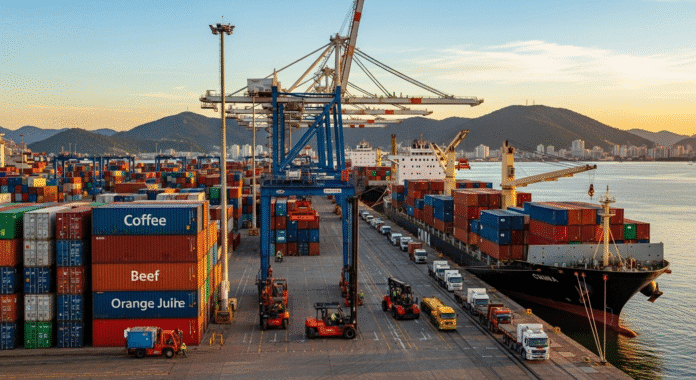Lula’s Stand on U.S. Tariffs Signals a New Era in Brazil-U.S. Trade Relations
Brazil’s President Luiz Inácio Lula da Silva made a striking statement amid escalating trade tensions with the United States. “I won’t humiliate myself” he declared, rejecting any idea of entering into tariff talks with former President Donald Trump. This bold pronouncement comes as the U.S. imposed steep tariffs on Brazilian goods, prompting Brazil to rethink its trade relationships and pivot toward new global partners. In this article, we explore the background of the dispute, delve into the economic and political dynamics, and examine the reactions and counterarguments that are shaping the future of Brazil-U.S. relations.
Understanding the Brazil-U.S. Tariff Dispute
What Sparked the Tariffs?
The recent trade conflict between Brazil and the U.S. began in April 2025 with a modest 10% tariff on Brazilian imports, intended as a corrective measure against what the Trump administration described as unfair trade practices. In July 2025, the situation intensified when President Trump announced a dramatic 50% tariff on a broad range of Brazilian goods, including key exports like beef, coffee, and orange juice. Although some high-profile products such as aircraft were exempt, the impact on Brazil was significant. The U.S. justified these measures on grounds of protecting American industries, addressing trade imbalances, and protesting Brazil’s domestic judicial actions related to former President Jair Bolsonaro.
Lula’s Defiant Response
In a pointed interview with Reuters, President Lula explained his refusal to engage in negotiations under these conditions:
“I won’t humiliate myself. The day my intuition says Trump is ready to talk, I won’t hesitate to call him. But today my intuition says he doesn’t want to talk.”
Lula’s statement reflects a broader philosophy of safeguarding national dignity and sovereignty. Rather than capitulating under external pressure, he has rallied his administration and supporters behind a strategy of economic resilience and diversification. By refusing to be drawn into talks he deems one-sided, Lula has positioned Brazil as a nation unwilling to compromise its core values for short-term concessions.
The Economic Impact—Who’s Feeling the Pain?
Industries Hit Hardest
The U.S. tariffs have reverberated through several key sectors of the Brazilian economy:
- Agriculture: Brazilian agribusiness, a cornerstone of the country’s export profile, has been particularly vulnerable. Exports of coffee, orange juice, and beef have suffered under the weight of a potential 50% drop in U.S. markets, putting thousands of jobs at risk.
- Aviation: Although some exemptions applied, Brazil’s aircraft manufacturing sector, which is crucial for companies like Embraer, faces uncertainty as supply chains and component sourcing become increasingly complex.
- Energy: Tariffs on ethanol and related energy products have pushed up costs and placed additional strain on an already volatile market.
According to Reuters, about 36% of Brazil’s export value destined for the U.S. is now burdened with these higher tariffs. Before these measures, the U.S. maintained a goods trade surplus with Brazil of roughly $7.4 billion, underscoring the sudden and potentially transformative impact of the new trade policy.
Shifting Trade Statistics and Market Diversification
As the U.S. tightened its grip on the bilateral trade relationship, Brazil quickly sought alternatives. Exports to Asia, particularly China—its largest trading partner—soared by 15% in the past year, signaling a decisive pivot aimed at mitigating U.S. pressure. President Lula’s government has also enacted an Economic Reciprocity Act, empowering Brazil to impose proportional tariffs on U.S. goods in response to perceived injustices. This legal tool underscores Brazil’s commitment to defend its interests while keeping the door open for future negotiations under more balanced conditions.
Reactions from Industry and Experts
Voices from Brazil
Brazilian industry leaders have expressed mixed but resolute reactions to the tariffs. Agribusiness representatives, including the Confederation of Agriculture and Livestock, warned of dire consequences should U.S. demand continue, projecting significant job losses and decreased market access. Yet, some economists remain cautiously optimistic, arguing that redirected demand from China could help offset the short-term losses. Manufacturing groups have also voiced concerns over the long-term ramifications, particularly regarding supply chain disruptions and reduced access to technology investments.
International Perspectives
Global trade analysts and international observers have weighed in with a broad array of opinions. Many experts argue that the U.S. tariffs are part of a wider protectionist trend under the “America First” agenda, where economic security and national manufacturing interests are claimed to be paramount. However, critics warn that such measures risk isolating the United States from key trade partners and could inadvertently benefit competitors like China. European leaders, in particular, have expressed solidarity with Brazil, emphasizing that unilateral trade actions set troubling precedents for global commerce.
Multinational corporations find themselves in a precarious position. For instance, Embraer highlighted that while U.S.-made components might help buffer the immediate impact, ongoing uncertainty could lead to long-term strategic shifts away from U.S. dependency.
The U.S. Perspective—Why Tariffs?
Arguments in Favor
Supporters of the U.S. tariff strategy contend that the measures are necessary to protect American industries and restore reciprocal trade relations. The U.S. boasts one of the lowest average tariff rates globally at around 3.3%, while countries like Brazil maintain much higher rates. Tariffs also serve as leverage against non-tariff barriers, including licensing restrictions and inadequate intellectual property protection during trade disputes.
Furthermore, proponents argue that these tariffs help secure critical domestic industries and fortify national supply chains, especially in light of recent vulnerabilities exposed by global crises. The overall aim is to promote a fairer trade environment where American products are not disadvantaged by heavy foreign tariffs or subsidies.
Counterarguments and Risks
Nonetheless, several critiques challenge the effectiveness of the U.S. approach. Critics argue that these tariffs could have unintended consequences, including higher operating costs for U.S. companies reliant on Brazilian imports. In pushing Brazil to seek alternatives like China or the European Union, the U.S. risks undermining its own market share in the long term. Moreover, retaliatory measures by Brazil could spur an escalating tariff war, further destabilizing global trade flows.
Experts have also raised concerns that Brazil’s heavy reliance on commodity exports limits its capacity to offset U.S. tariffs through diversification alone. With a significant portion of its revenue tied to a few key sectors, Brazil might struggle to achieve a balanced trade portfolio quickly, leaving both nations exposed to prolonged economic fallout.
Brazil’s Strategy—Resilience and Diversification
Legal and Diplomatic Maneuvers
In response to the tariffs, Brazil has taken several steps to protect its interests. The government has lodged a formal complaint with the World Trade Organization, challenging the legality of the U.S. measures. While the effectiveness of the WTO’s dispute resolution process remains uncertain, this move signals Brazil’s commitment to upholding international trade norms.
At the diplomatic level, Lula’s administration is accelerating efforts to forge closer ties with key global players. Strengthening economic relations with China and the European Union is a central tenet of Brazil’s strategy, aimed at reducing dependency on any single market and encouraging multi-lateral trade engagements. This pivot not only underscores Brazil’s search for new revenue streams but also repositions it as a proactive player in reshaping global trade dynamics.
Rallying Domestic Support
Beyond legal and diplomatic channels, Lula has tapped into nationalism as a powerful tool to bolster domestic unity. By framing the dispute as one of national honor and sovereignty, he has rallied public support behind his administration’s policies. “One president can’t be humiliating another. I respect everyone and I demand respect,” Lula asserted, urging Brazilians to take pride in a stance that defies external pressure. This narrative has resonated broadly, reinforcing a collective determination to persist through economic challenges while asserting Brazil’s independence on the world stage.
What’s Next for Brazil-U.S. Relations?
The ongoing tariff dispute could herald a long-term transformation in Brazil-U.S. relations. While the immediate economic impact is tangible, the broader implications touch on geopolitics and global trade order. Brazil’s recalibration toward partnerships with China, the EU, and BRICS nations may reduce traditional U.S. influence in the region. For the United States, the challenge lies in balancing protectionist policies with the need to remain competitive in an increasingly interconnected world. As both nations chart their paths forward, the outcome of these measures will likely influence international trade policies for years to come.
Conclusion: Standing Tall in a Changing World
President Lula’s resolute refusal to engage in what he perceives as unbalanced tariff talks with Trump serves as a powerful statement of national dignity and economic independence. By pivoting toward diversified trade partnerships, pursuing legal recourse, and rallying domestic support, Brazil is laying the groundwork for a future that challenges traditional global power structures. The coming months will reveal whether this bold strategy can successfully mitigate the economic pain of U.S. tariffs while redefining Brazil’s role in the global marketplace.
What are your thoughts on Brazil’s strategy? Join the conversation by sharing your perspective, and stay informed on how global trade is evolving in this new era.




